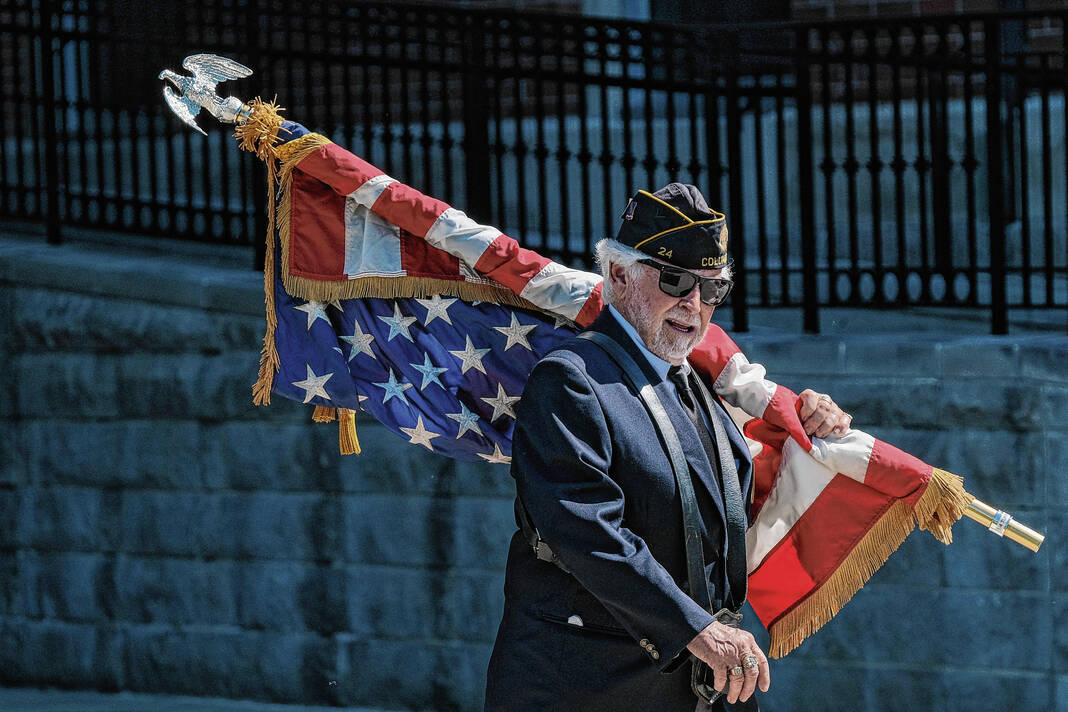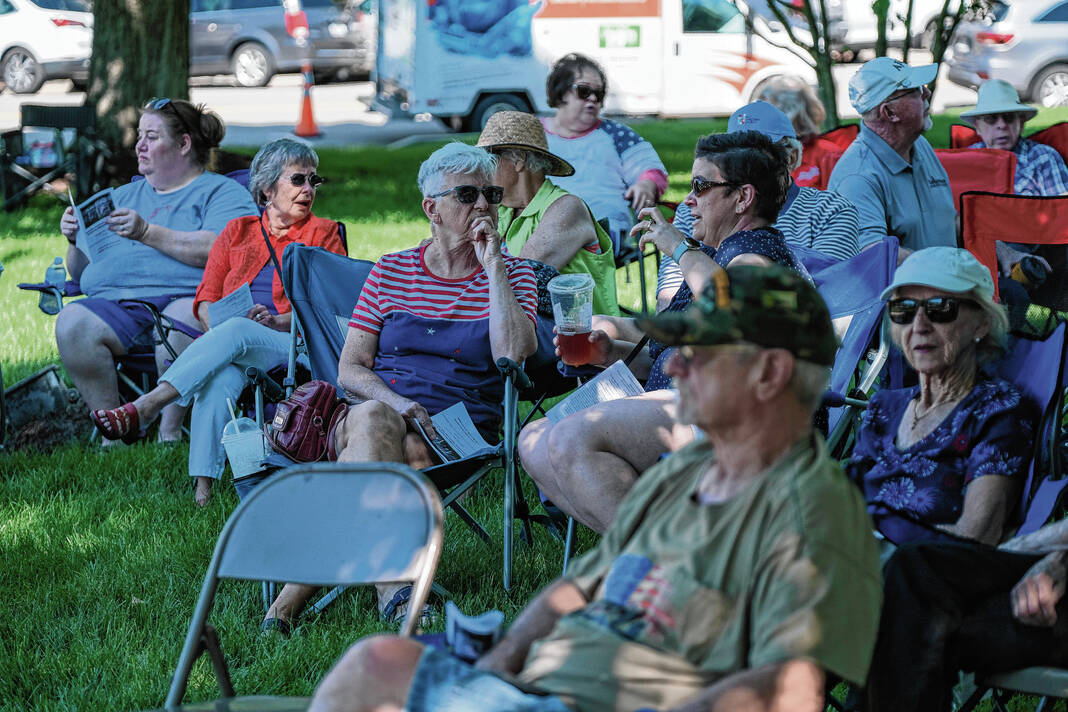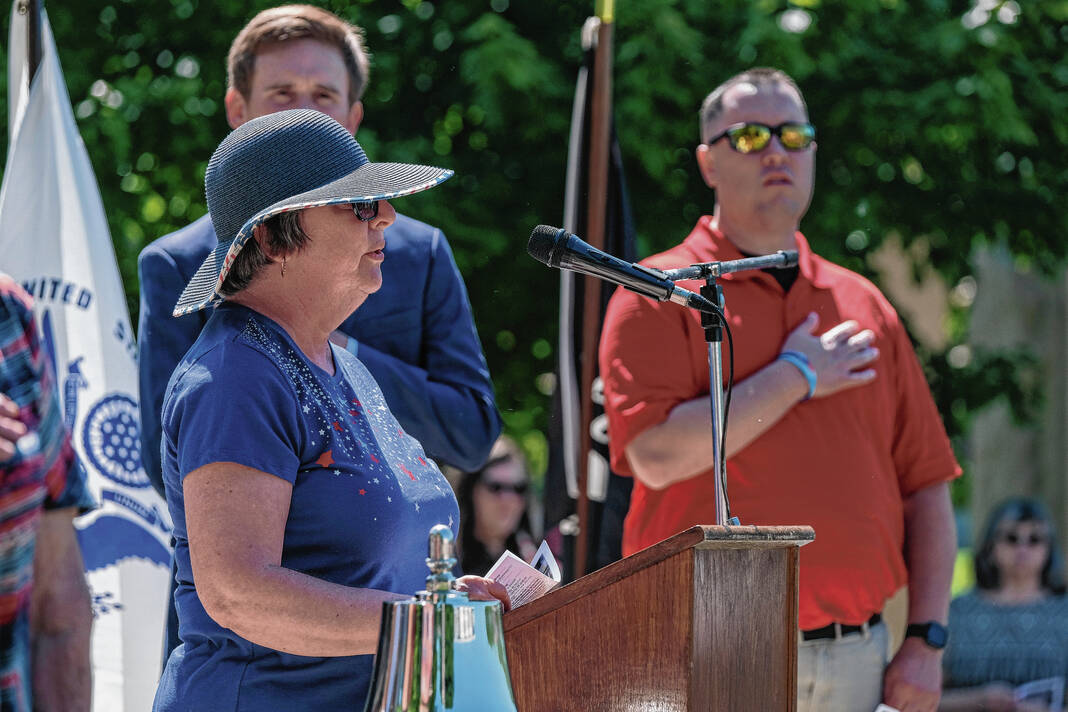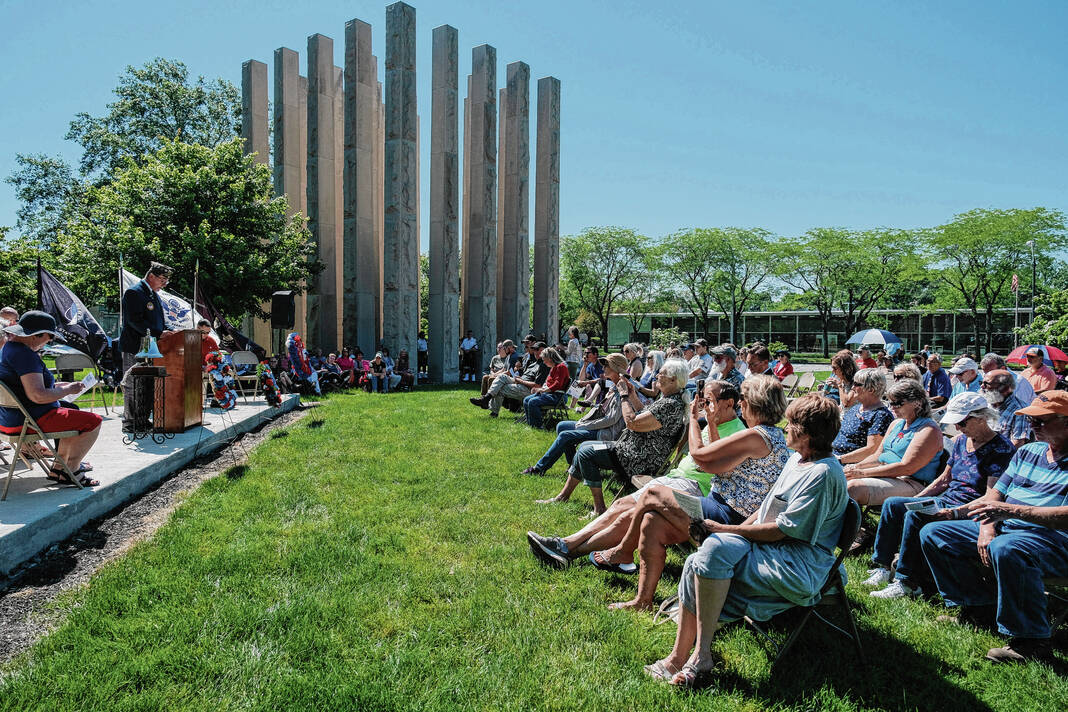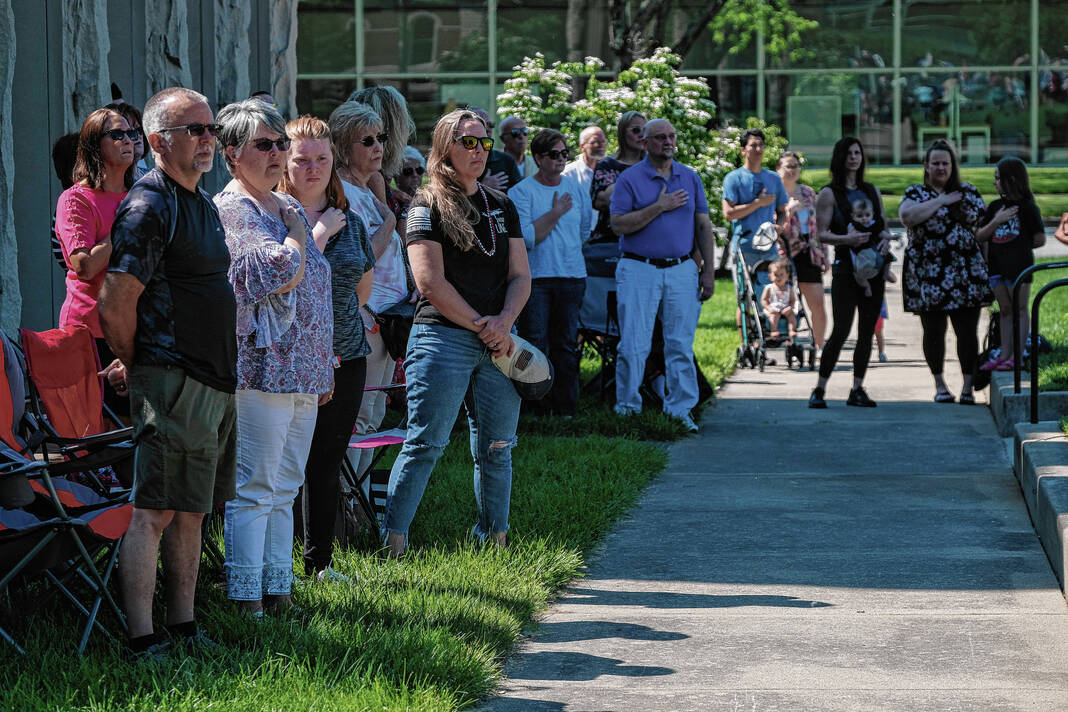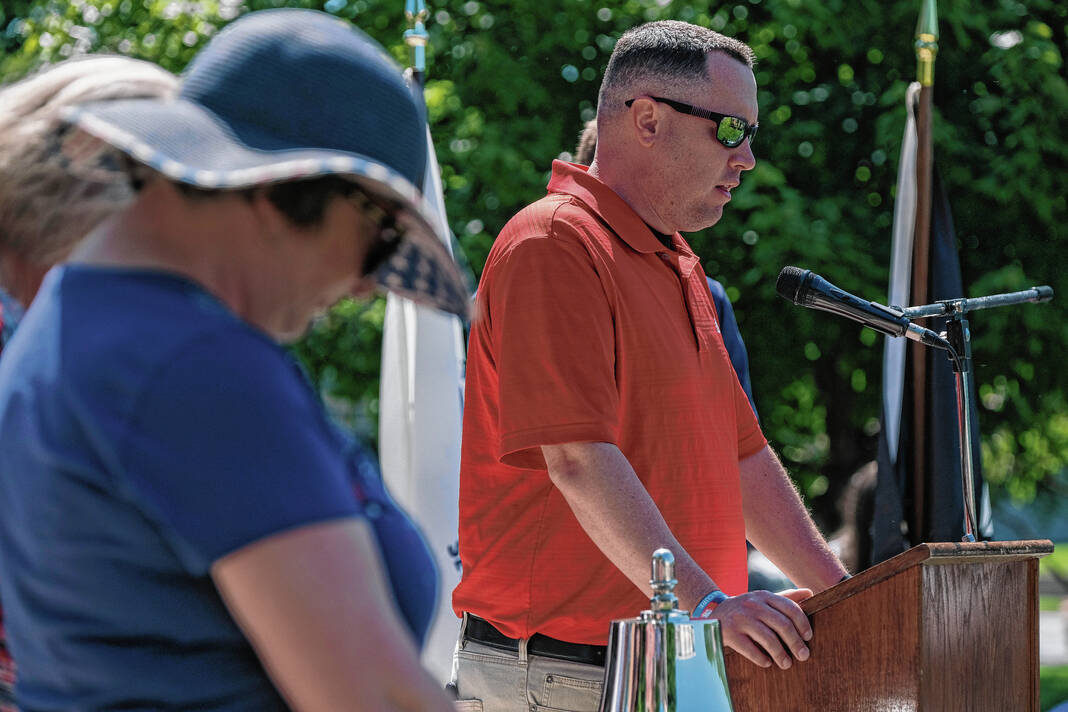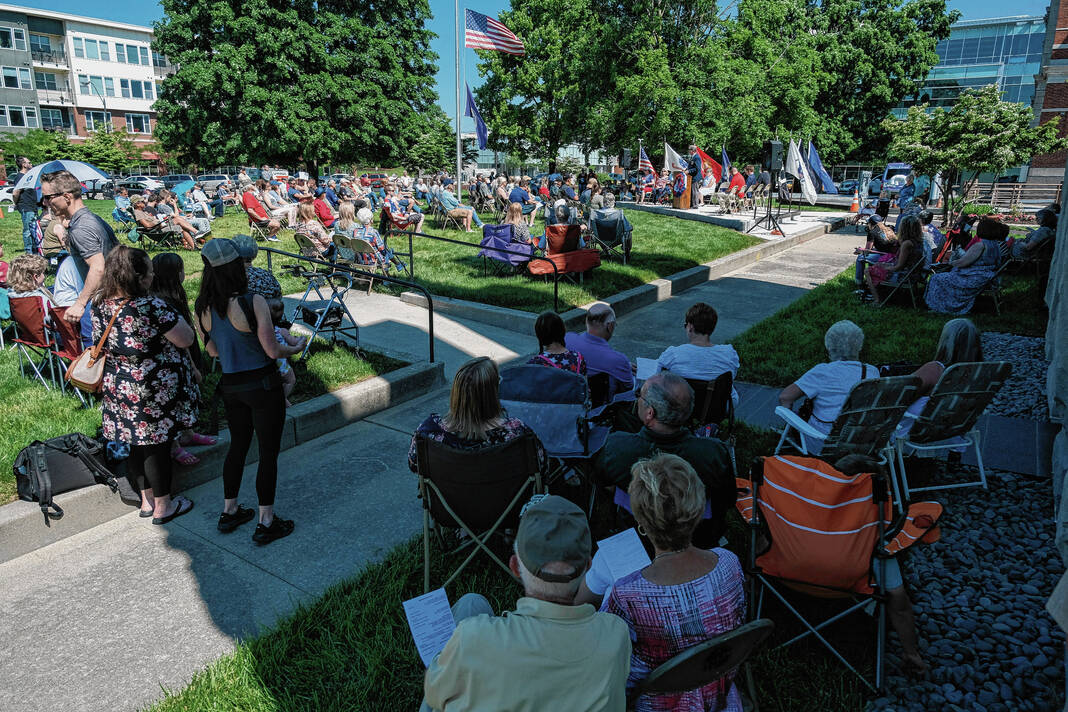Four veterans are the first graduates from a local court program specifically designed to help them turn their lives around from low-level criminal behavior.
They were honored Tuesday at an evening ceremony at YES Cinema for completing requirements of the Bartholomew County Veterans Court program, established last year as an intensive program geared toward helping veterans turn away from the lingering after-effects of combat, which sometimes manifests itself in committing crimes.
Chris Reeves, 30, Columbus, who successfully completed the requirements to graduate from the program in April, said he had a difficult time adjusting to civilian life after serving in the U.S. Air Force and then in the Army, leaving the military in 2009.
“I was using alcohol to cover up and heal temporarily what I was going through,” he said.
[sc:text-divider text-divider-title=”Story continues below gallery” ]
That time period led to run-ins with law enforcement and eventually resulted in him facing charges of operating a vehicle while intoxicated and disorderly conduct, he said.
But after being accepted into the program, Reeves said the program changed him as an individual and allowed him to evolve into a better person.
“It’s changed me and my outlook and all the options in my life,” he said. “It made me realize that I can let go of the past and I can move forward with my future.”
Reeves was joined at the graduation ceremony by his girlfriend, Katelyn Sublette, and their son, Leo.
Sublette also said she’s proud of the hard work Reeves put into completing the program.
“I think it’s definitely made him a better person,” she said.
Second-chance program
Bartholomew County’s Veterans Court was established in February 2016 as an 18- to 24-month second-chance program for offenders who have served in the military and have been adversely affected by long-term combat conditions.
The program initially started as an all-volunteer effort with county employees taking on additional responsibilities, said Brad Barnes, director of Bartholomew County Court Services and chief probation officer. The Indiana Judicial Center appropriated $44,751 for the program last year and has received about $60,000 to offset operational expenses, Barnes said.
Other funding comes into the program from various fees paid by participants. Veterans charged with misdemeanors pay $100 upfront in initial and administrative fees as well as $20 per month for up to 18 months. For veterans charged with felonies, it is $200 in upfront fees, followed by $30 a month.
Bartholomew County’s program is one of 84 problem-solving courts offered around the state which have different areas of focus — courts for domestic violence, family dependency, drugs and mental health, among others, said Indiana Supreme Court Justice Steven David, a Columbus native.
David, a veteran who gave the keynote address at Tuesday’s ceremonies, said Bartholomew County’s veterans court program is a collaborative community effort.
“Who do we owe a greater sacrifice to than our veterans?” he asked. “For everyone involved, especially the graduates, it’s worth every penny invested in the program.”
David referred to the graduates as the four most important people in the room and had some words to share with them.
“Everyone is here to celebrate you,” David said.
He also reminded them of individuals such as mentors and staff on the court’s treatment team that helped them along the way. Participants in the program are paired with a mentor who is also a veteran to offer them support and guidance.
“You made it to this day. That helped retain faith in yourself and that is a tremendous accomplishment,” David said.
Getting started
Bartholomew Superior Court 1 Judge James Worton oversees the veterans court, which is designed to address the causes that lead veterans to be charged with a crime. Those can include post-traumatic stress syndrome, brain trauma, anxiety, depression, chemical dependency, unemployment or homelessness.
An offender who is a veteran receives a referral from workers assigned to the case in the judicial system, which is then reviewed by the county prosecutor’s office. If the prosecutor doesn’t object, then it is considered by Worton, who makes the final decision on whether to approve the veteran for the program.
Veterans court is held in Worton’s courtroom on the second and fourth Thursdays of every month, and can serve no more than 25 veterans at any given time, the judge said.
Veterans who are charged with minor drug offenses that are Level 5 or Level 6 felonies or misdemeanors such as driving under the influence are eligible for the program, Worton said. Individuals who have been charged with major felonies, serious violent offenses or sex offenses, as well as those who had a criminal history prior to their enlistment, cannot be accepted.
One of the first requirements of the program is offenders are required to plead guilty to their charges as part of the program. Other requirements include undergoing regular risk assessments from their case managers, mental health professions and Veterans Administration officials.
Individuals are required to agree to participate in a five-level program with each level being broken up into different time frames. Each veteran must attend court hearings, meet with their case managers to discuss their case plan, which is a listing of treatment options and areas of need. Each veteran may also be required to undergo drug testing, at intervals ordered by the program.
Individuals who successfully complete the program are eligible to have their charges dismissed by the court and also receive after-care support that involves access to resources they may need.
However, if someone is non-compliant with the program requirements, they proceed directly to sentencing since they have already pleaded guilty to criminal charges, Worton said.
Ten veterans are in the program currently, while there are six pending applications, Worton said. Three individuals have failed to complete the program so far, he said.
Columbus resident Joseph Carroll was selected for the veterans court program after being arrested on a Level 6 felony charge of possession of methamphetamine.
Under the terms of his probation, he said he was required to attend Centerstone, a behavioral health facility in Columbus, and an intensive outpatient program that lasted about four months. However, he was then ordered to attend a 28-day treatment center in Louisville if he wanted to continue to receive services at Centerstone, he said.
Attending the treatment center and being involved in the veterans court program helped him stay clean, Carroll said. Part of his requirements to graduate from the veterans court program was calling a drug hotline, which monitored his success of reporting to Community Corrections for drug testing three times a week.
He graduated from the program June 8 and said his life is much better now.
“I’m blessed to have the opportunity to be alive because of this program,” Carroll said. “It’s great because it’s an opportunity to start fresh.”
Future program growth
David believes the number of veterans court programs will increase over time as the Indiana Supreme Court takes a closer look at where they are offered throughout the state. There are 19 courts operating now and the Supreme Court hopes to see 21 in place by the end of this year, he said.
“No matter where that veteran is, if they’re eligible to participate, they’ll have that opportunity,” David said of the future of veterans courts in the state.
David also said it’s important to provide veterans with resources they may need to get their life back on track.
“This is not a free pass for a veteran,” David said. “We know what they’re going through to support the oath of the Constitution of the United States. Here’s an opportunity to rehabilitate them.”
Each county can determine a person’s eligibility, although the success of someone completing the program is up to them entirely, he added.
“They’ve got to make that decision to be helped,” David said.
The goal is to have individuals complete the program rather than being locked up, pointing out that it costs $20,000 annually to incarcerate an inmate in Indiana, David said.
“You rarely have success with someone going to jail or sitting in prison,” he said.
Still, David said he hopes that Bartholomew County leaders are behind the program to help veterans in need, adding that he understands what those individuals are going through as a veteran himself.
“It really does create a caring group of stakeholders to move it forward,” he said. “This (program) is to try to save this person.”
Some veterans who have entered the program in Indiana may have been deployed overseas several times since 9/11, which may have impacted them personally, David said. The veterans court program is meant to help and give them resources they may need, he said.
“You can give them a path forward to become productive citizens again,” he said.
[sc:pullout-title pullout-title=”Program requirements” ][sc:pullout-text-begin]
Offenders who are veterans that are accepted into the Bartholomew County Veterans Court must successfully complete tiers of supervision and treatment in order to graduate from the program. The levels include:
- Level one is a minimum of 60 days, requiring participants to attend court twice a month, meet with their case manager once a week and undergo a minimum of two random drug tests a week.
- Level two is a minimum of 120 days and requires participants to attend court twice a month, meet with their case manager and undergoing drug tests.
- The third level — which is for six months — requires a visit to court once a month, drug testing and meeting with case managers twice a month.
- Level four requires to meet with their case manager and attend court once a month.
- The final phase is for 90 days and requires drug testing once a month, but participants do not have to come to court except on the last day tied to the program.
[sc:pullout-text-end][sc:pullout-title pullout-title=”How it’s funded” ][sc:pullout-text-begin]
A non-reverting fund to operate Veterans Court was approved by the Bartholomew County Commissioners. It is used to hold money obtained from program participants.
Those fees are collected only for operating costs, such as obtaining personnel and materials, according to presiding Judge James Worton.
In all cases, a traditional $183 in court fees will be assessed. After that, charges are based on the extent of the crime.
For misdemeanor charges, there’s a $50 initial fee and a $50 administrative fee, as well as $20 per month charge during the 12- to 18-month program, Worton said.
When the case is a felony, it’s $100 initially, $100 for administrative purposes and $30 per month.
The fund will also hold money from grants that are now anticipated after the local program was certified in December by the Indiana Judicial Center, Worton said.
Most provided services are available through the Veterans Administration. Those not eligible for VA benefits may be able to tap into grant-funded resources in order to receive treatment through either Centerstone, a community-based behavioral health care organization, or Valle Vista Health System in Greenwood, Worton said.
[sc:pullout-text-end][sc:pullout-title pullout-title=”Problem-solving courts” ][sc:pullout-text-begin]
For a listing of Indiana’s problem-solving courts and the judges and administrators for them, visit:
in.gov/judiciary/pscourts/files/pscourts-psc-directory.pdf
[sc:pullout-text-end][sc:pullout-title pullout-title=”Pull Quote” ][sc:pullout-text-begin]
“Who do we owe a greater sacrifice to than our veterans? For everyone involved, especially the graduates, it’s worth every penny invested in the program.”
— Indiana Supreme Court Justice Steven David on the veterans court program
[sc:pullout-text-end]


